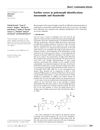Search
for
Sort by
Research
180-210 / 1000+ results
research Post-COVID-19 Syndrome: Persistent Symptoms at the Post-Viral Stage of the Disease. A Systematic Review of Current Data
Many patients experience long-lasting symptoms like fatigue and pain after COVID-19, regardless of initial disease severity.

research Safety of Low-Dose Oral Minoxidil Treatment for Hair Loss: A Systematic Review and Pooled Analysis of Individual Patient Data
Low-dose oral minoxidil is a safe treatment for hair loss, with the main side effect being excessive hair growth. Other side effects like foot swelling, low blood pressure when standing, and heart rate changes are rare.

research Glucoraphanin and Sulforaphane Biosynthesis Mediated by Melatonin and Nitric Oxide in Hairy Roots of Broccoli: Insights from Transcriptome Data
Melatonin helps broccoli roots produce anti-cancer compounds by controlling nitric oxide and hydrogen peroxide levels.
research Comparison of Postoperative Mid-Term and Long-Term Quality of Life Between Billroth-I Gastroduodenostomy and Billroth-II Gastrojejunostomy After Radical Distal Gastrectomy in Patients With Gastric Cancer: A Cohort Study Based on a Case Registry Database
Both Billroth-I and Billroth-II methods have similar impacts on quality of life after gastric cancer surgery.
research Valproate, Acetylcarnitine, Folic Acid, and Vitamin B12 in Spinal Muscular Atrophy: Preliminary Data of an Open-Label Study in Children
The treatment with valproate, acetylcarnitine, folic acid, and vitamin B12 may improve muscle strength in children with SMA without significant side effects.
research Is Finasteride Intake Associated with Penile Curvature/Peyronie’s Disease? Assessment of Both the Food and Drug Administration (FDA) and the European Medicines Agency (EMA) Pharmacovigilance Databases

research Suicidal Behaviors (Suicidal Ideation, Suicide Attempt and Completed Suicide) in Patients Treated with Finasteride for Hair Loss: Results from the U.S. FDA Adverse Event Reporting System Database

research Beyond Hair Loss: Exploring the Evolution of Androgenetic Alopecia Research Based on Text Mining and Bibliometrics
Visualizing data helps guide future androgenetic alopecia research and policies.

research Beyond Hair Loss: Exploring the Evolution of Androgenetic Alopecia Research Based on Text Mining and Bibliometrics
Data visualization tools are crucial for understanding and advancing androgenetic alopecia research.

research Network-Based Drug Repositioning: Approaches, Resources, and Research Directions
The document concludes that computational methods using networks and various data can improve the process of finding new uses for existing drugs.

research Prediction of Male-Pattern Baldness from Genotypes
Genetic data can predict male-pattern baldness with moderate accuracy, especially for early-onset cases in some European men.
research The Temptation of Large Numbers: Pitfalls in Epidemiological Research
Large databases in research can lead to misleading conclusions due to biases and chance findings; researchers should analyze data more rigorously.
research An Observational Study to Standardize the Dermoscopic Findings of Normal Scalp and Hair in Males
Standardized data is essential for diagnosing scalp and hair conditions in males.

research More Cancer, Better Counting or Better at Diagnosis? The History of Skin Cancer Registration
High-quality data on skin cancer is crucial for understanding its trends and allocating healthcare resources effectively.

research Assessment of Multidimensional Health Care Parameters for Developing a Virtual Human Generative Model: A Cross-Sectional Study in Japan
The study aims to create a model to predict health attributes using diverse health data from Japanese adults.

research Patient Registry of Outcomes in Spasticity Care
The data suggests that dosing differences can help manage spasticity in patients with upper motor neuron dysfunction.

research Google Trends as a Tool for Evaluating Public Interest in Facial Cosmetic Procedures
Google Trends data on facial cosmetic procedures matches actual surgery numbers, showing it can help plastic surgeons understand public interest.

research Using a Capture–Recapture Method to Assess the Frequency of Adverse Drug Reactions in a French University Hospital
The study found that combining different databases gives a better estimate of drug side effects in hospitals.

research Twenty-Five and Up Study: A New Wave of the Brisbane Longitudinal Twin Study
The 25Up study collected extensive data on mental disorders and related factors in Australian twins and siblings to investigate the genetics of psychiatric illnesses.

research Traditional Knowledge Digital Library: The Challenges Ahead
The document suggests creating a secure database for indigenous knowledge and recommends that the TKDL actively fight patents that slightly alter traditional knowledge.

research Retraction of: Comparison of Finasteride Versus Flutamide in the Treatment of Hirsutism
The article was retracted due to data integrity issues.

research Review on Alopecia Areata in the Middle East and Africa: Landscape and Unmet Needs
The Middle East and Africa need better data, treatment consensus, and support for Alopecia Areata.

research Retraction of Crystallization Engineering in Aza-Steroid: Application in the Development of Finasteride
Authors retracted paper due to errors in data and mislabeling.

research The Current Role of Laser and Light Sources in the Treatment of Male and Female Pattern Hair Loss
Laser/light treatments for hair loss are popular but lack scientific data proving effectiveness.

research Further Errors in Polymorph Identification: Furosemide and Finasteride
Errors found in identifying furosemide and finasteride polymorphs due to incomplete data.

research A Guide for Building Biological Pathways with Two Case Studies: Hair and Breast Development
The document explains how to create detailed biological pathways using genomic data and tools, with examples of hair and breast development.

research Microsporum Canis-Induced Tinea Capitis: A Rapid Screening Algorithm
A rapid screening method using trichoscopy and clinical data can improve diagnosis and treatment of tinea capitis.

research Comments on 'Maternal–Fetal Safety Evaluation of an Aqueous Extract of Casearia Sylvestris Leaves in Rats' (Nagaoka et al., 2023)
The commentary stresses the importance of using historical control data and proper interpretation in evaluating developmental toxicity.

research What Happens When Simulations Get Real and Cosmetic Dermatology Goes Virtual?
AI and AR are improving cosmetic dermatology but face challenges like data quality and ethical concerns.